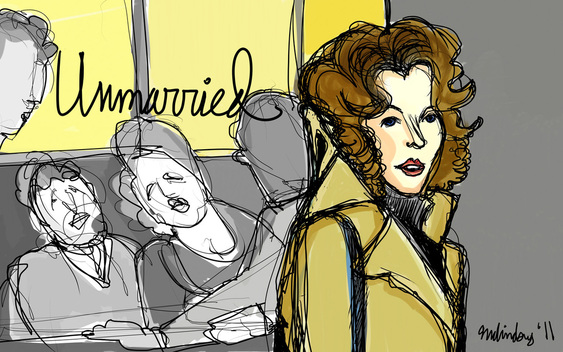My stepfather Tom passed away Sunday evening. Although he had been very sick with cancer that call is never less than shocking (as my partner says there is never a “good” time for this news). I listened as my mother cried and simultaneously delivered the bad news. Her voice was tired but there was a lot of dignity in it, and I did my best to be normal, but a death will always drop the floor from beneath you. Normal is the least of what you feel.
After that first round of phone calls I found myself nervously looking for something to do. I started polishing my silver bracelets - first the one from Mexico, then the one from St. Croix, and then moving on to a tarnished picture frame. I needed to do something with my hands; somehow this felt more solid. I popped some popcorn and started trolling the on-demand selections for a late night movie. I wasn’t having much luck – I’ve seen so many that I am starting to believe I might be full. Then I came across Paul Mazursky’s “An Unmarried Woman” (1978) and even though I had seen it before I selected it. I needed something beautiful and comfortable to watch. Something me.
The first thing that I love about this movie is the look of it: a free trip to 70s New York, artists still safely in their SoHo lofts, the 80s still around the corner (presaged by Jill Clayburgh’s husband’s Wall Street job and expensive running shoes), parts of the city looking boldly pornographic and dirty, all of it so carefully shot. It is a classic women’s picture (a genre sorely absent today apart from gooey romances): pictures that allow you to empathize with a woman’s full range of emotions. Although she resented it publicly, Erica is surely Clayburgh’s best role and performance. Sensitively written about a seemingly happy marriage that collapses, she flickers between a cool, delighted amusement to the deeper notes of exasperation, dreaminess, the ridiculous, and sorrow. Hers was a questioning face. I am afraid that today’s version of the smart woman on screen is either all man or all jokes – there is no new Jill Clayburgh. Perhaps it was the 70s alone that allowed her to exist – so “me”, so messy, so new to relaxed clothes and the social awareness that the sexual revolution allowed the normal person.
Some of my favorite scenes are her post-divorce sessions with her therapist Tanya in a very ‘Village’ apartment. Wonderfully portrayed by real life therapist Penelope Russianoff, they rap while sitting on the floor propped up by cushions, pointedly post-Freudian, eye to eye, the stray lone teardrop rolling down Clayburgh’s beautiful Waspy face. I love that Mazursky leaves in the grit of the stray potted plants outside of badly painted pre-war windows, a beautiful afternoon light pouring in as the two women just talk. It is very comforting to watch these scenes.
I also love that in a movie so feminine (I could easily compose another essay entirely devoted to her three beautifully realized female friends, especially the fabulous Kelly Bishop playing Elaine, a severe depressive on the mend) that men are fully represented – horny, willful, obtuse, engaged and equally as dreamy as their counterparts. I cannot imagine similar depictions today; men have been so silenced and changed by feminism and political correctness it is astounding to see them in full color. Watching the movie one doesn’t root for Erica at her husband Martin’s absolute expense, or despise the Romeo Charlie who takes her to bed, or then dismiss the bearded Alan Bates’ Saul as macho. Every character appears to move through the story as fluidly as fish in an aquarium. Even Lisa Lucas playing Patti, Erica’s precocious, mouthy 15 year-old daughter (the most hackneyed stereotype from late 70s films) has moments of blank defiance of the norm, showing frankness and childishness in equal measure.
As the movie closes lover and artist Bates is leaving and Erica is walking behind the framework of a huge color field painting (her farewell gift, so large it has been lowered from a window). “How in the hell am I going to get it home?” she asks. “Take a taxi” he laughs as he drives off. As Clayburgh navigates the painting down some crowded part of lower Manhattan, the metaphor seems clear. She is strong, the artwork is strong, and the wind is strong, all at once. How she gets it home is a mystery – the credits are rolling. Unable as I was to summon a full response to a death in the family, I chose instead to give myself over to this team of artists from another time and place. Did I have catharsis? Well - not quite. Life is not always so timely, or as perfect, as this.


 RSS Feed
RSS Feed
